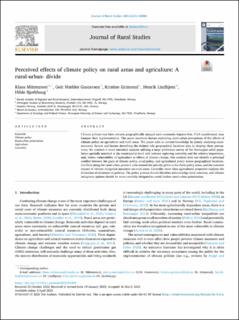Perceived effects of climate policy on rural areas and agriculture: A rural-urban divide
Peer reviewed, Journal article
Published version
Permanent lenke
https://hdl.handle.net/11250/3084504Utgivelsesdato
2023Metadata
Vis full innførselSamlinger
- Artikler [231]
- Publikasjoner fra CRIStin [463]
Originalversjon
10.1016/j.jrurstud.2023.03.009Sammendrag
Climate policies may have adverse geographically unequal socio-economic impacts that, if left unaddressed, may hamper their implementation. This paper examines factors explaining rural-urban perceptions of the effects of climate policy on agriculture and rural areas. The paper adds to current knowledge by jointly analysing socio-economic factors and factors describing the distinct role geographical locations play in shaping these perceptions. We conduct a novel statistical analysis utilising a large preference survey of the Norwegian adult population spatially matched at the municipality level with indexes capturing centrality and the relative importance, and, hence, vulnerability of agriculture to effects of climate change. Our analysis does not identify a principal conflict between the goals of climate policy, rural policy, and agricultural policy across geographical locations. Conflicts along the rural-urban gradient arise around the priority given to the three policy areas, and the concrete impact of climate mitigation measures on rural areas. Centrality more than agricultural properties explains the formation of resistance to policies. The policy process should therefore acknowledge rural concerns, and climate mitigation options should be more carefully designed to avoid further rural-urban polarisation.
